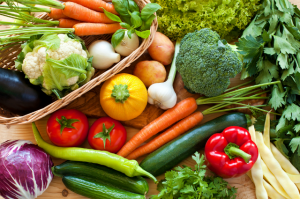Are Veggies Giving You Gas?
Ok. You’ve cleaned up your diet. You’re eating more fruits, veggies, and whole grains
than ever before. Maybe you’re even seeing improvements in your physique.
But you’re still struggling with belly bloat, gas, pain, and possibly constipation or
diarrhea.
Ugh! What the heck?!
#1 Cleanse Secret (takes just 6-minutes a day)
Here’s where listening to your body is an absolute must — not only for a trim
midsection but also for great energy and lasting health.
Even so‐called superfoods may not be all that super for
your body.
A certain group of carbohydrates and sugars called FODMAPs may be responsible for your stubborn pooch belly and chronic tummy troubles.
FODMAPs are hard to digest fibers that are incompletely absorbed in the
gastrointestinal tract.
They easily ferment when exposed to gut bacteria, which draws fluids into the large
bowel leaving you bloated, gassy, in pain, and struggling with bouts of constipation
or diarrhea.
Simply following a diet program — even a really great one — doesn’t mean much if
you ignore the symptoms of an irritable bowel.
Your gut is the epicenter of your health. Known as the micro‐biome, your gut is an
ecosystem teeming with life — including 3 pounds of bacteria that:
o Digest food
o Produce vitamins
o Regulate hormones
o Excrete toxins
o Make healing chemicals
Disruption of this life force can feel like the life is being forced out of you — sluggish,
irritable, and gaining weight.
Here are the major food categories of FODMAPs you can begin paying attention to:
● Grains, Cereals
● Legumes and Nuts
● Dairy
● Sugars
● Vegetables
● Fruits
Many of these foods are the very superfoods containing vital vitamins, minerals,
phytochemicals and antioxidants I encourage you and my clients to get through diet.
Here’s the thing — all of that is true. But what is also true is that your body is
unique. You may be able to eat foods that would send me into serious tummy trouble and
vice versa. That’s why it’s so important to know your body and pay attention to
how you feel after eating.
>>>Free 6 week meal plan. Download it today!
What To Do If Veggies Give You Gas:
Rule #1: Track physical symptoms after you eat.
Regular digestive issues — even headaches, energy dips, anxiety, and
depression—indicate you may be sensitive to the FODMAPs in that particular food.
Rule #2: Eat the suspected food alone with these parameters to guide you:
● Quantity: How much can YOU tolerate? Less than 1⁄2 cup or none at all?
● Quality: Is organic better than conventional?
● Cooking Method: Is cooked better than raw?
● Time of Day: Feel OK in the morning, but not after lunch?
Rule #3: Trust your gut.
You CAN be the expert in your own self‐care needs. Pique
your curiosity, learn from your discovery and respect your body!
